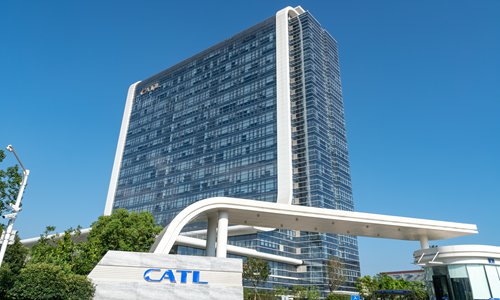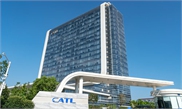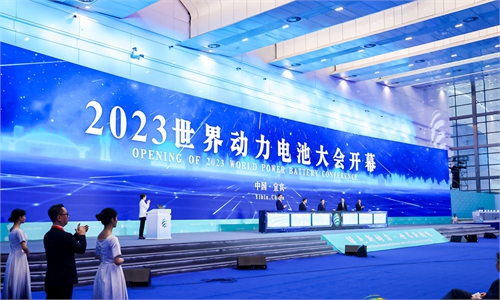
A view of CATL headquarters in Ningde, East China's Fujian Province Photo: VCG
Citing the fabricated lie that China's northwestern region Xinjiang using "forced labor," some US lawmakers are seeking to scrutinize a licensing agreement between US carmaker Ford Motor and Chinese battery giant CATL involving a planned joint battery plant in the US.In a letter to Ford CEO Jim Farley, the US lawmakers demanded that the vehicle producer provide detailed information about "a copy of the licensing agreement and any communication about the deal between the two companies as well as between Ford and the Biden administration regarding any potential tax credits," said a report by CNBS on Friday.
Citing staff from CATL, domestic Economic View reported on Monday that the joint project with Ford is now progressing normally.
Anti-China American politicians have kept playing up the "forced labor" lie in Xinjiang Uygur Autonomous Region to an even greater extent in order to defame China, Gao Lingyun, an expert at the Chinese Academy of Social Sciences in Beijing, told the Global Times on Sunday.
Their approach of political manipulation shows a complete disregard for established economic rules, under which companies pursue cooperation that will maximize their respective interests. The case serves as a reminder to exercise caution in collaboration with the US, Gao warned.
The real intention behind the US politicians' malicious slandering of Xinjiang region is to "score political points" for themselves or their political parties, Gao noted
China has developed obvious advantages in new-energy vehicle development, particularly in battery making. In 2022, CATL's global market share for electric batteries reached 37 percent, an increase of 4 percentage points from 2021, maintaining its position as the world leader for six consecutive years, according to media reports.
And, sabotaging such cooperation will push up US carmakers' costs, hampering the long-term development of American vehicle industry and hindering global efforts in energy saving and carbon reductions, experts said.
Zhang Xiang, visiting professor at the Engineering Department of Huanghe Science and Technology University, told the Global Times that the US has been targeting China's leading high-tech firms, including the new-energy sector. "The baseless hype around the fabricated forced labor accusations demonstrates that the US politicians are resorting to any means to achieve their goals, just like their previous attack on Huawei," Zhang said.
Economic and trade tensions between China and the US have shown signs of easing following recent intensive visits by senior American officials to China, including Treasury Secretary Janet Yellen. "Both sides have expectations," Gao said.
But the "small yard with high fence" strategy of the US has escalated, which may lead to "not optimistic" future for bilateral economic and trade collaboration, Gao said.
On February 14, CATL told the Global Times that it had accepted an invitation from Ford for cooperation, and would provide preparatory and operational services for Ford's battery plant in the US state of Michigan. The two sides had reached a patent licensing agreement for battery technology.
In response to media questions over criticism by US politicians over the collaboration, Chinese Foreign Ministry spokesperson Wang Wenbin said on February 14 that normal economic and trade cooperation between Chinese and US companies should not be politicized.
"We urge certain individuals in the US to abandon ideological bias, stop overstretching the concept of national security or suppressing foreign companies," he said.



